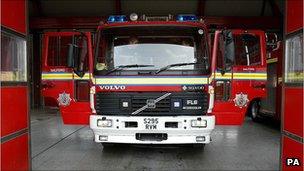Failed fire project wasted £469m, says committee of MPs
- Published
- comments

The project aimed to replace 46 fire control centres with nine state-of-the-art regional centres
A project to set up nine regional control centres for fire and rescue services in England was a "complete failure" and wasted £469m, MPs say.
The public accounts committee said the Firecontrol scheme had not achieved any of its objectives and that eight of the centres were empty "white elephants".
The plan to replace 46 smaller control rooms was scrapped in December 2010.
Fire Minister Bob Neill said Labour must be held accountable for the "comprehensive failure".
Margaret Hodge, who chairs the MPs' committee, said the project had been "flawed from the outset" and one of the worst wastes of public money for many years.
"The taxpayer has lost nearly half a billion pounds and eight of the completed regional control centres remain as empty and costly white elephants."
She said the project - launched in 2004 by the Labour government - had been terminated in 2010 "with none of the original objectives achieved and a minimum of £469m being wasted".
'Extraordinary failure'
Firecontrol aimed to abolish 46 local fire and rescue control rooms around the country and replace them with nine state-of-the-art centres linked by a new IT system.
The regional control centres would have covered regions defined as East, East Midlands, London, North East, North West, South East, South West, West Midlands and Yorkshire and Humberside.
It was hoped the project would provide a better co-ordinated response to emergencies, such as terrorist attacks, floods and rail crashes.
However, the MPs' report said the IT system "was simply never delivered" and that the Department for Communities and Local Government had "fatally undermined" the project by not working properly with local fire services.
"The department excluded them from decisions about the design of the regional control centres and the proposed IT solution," it added.
The cross-party committee - which heard evidence in July - also said the project had been "rushed" and got Treasury funding without proper scrutiny of feasibility and costs.
Those involved with Firecontrol also showed "an extraordinary failure of leadership", said the committee.
No-one had been made accountable, said the MPs, and senior staff "have carried on as if nothing had gone wrong" while continuing to work on other government projects.
Out of the nine buildings constructed, only the London centre has so far been transferred to the local fire and rescue service.
However, negotiations are ongoing for another four to become occupied.
The empty buildings cost the taxpayer £4m every month to maintain, the committee heard.
Margaret Hodge: "The project management was dire"
Mr Neill said the project was "the latest in Labour's catalogue of costly IT failures".
"Not for the first time, hard-working taxpayers are paying for Labour's inability to manage risks and control costs," he said.
"I welcome this report which exposes the absence of basic project management and leadership for a major undertaking. Labour must be held accountable for this comprehensive failure."
'Proper oversight'
Matt Wrack, general secretary of the Fire Brigades Union, said he welcomed the report, but added that the fallout from the project was still being felt.
"[It] failed because ministers failed to listen to the voice of control staff and their professional representatives," he said.
"We argued that the project was not resilient and there was insufficient scrutiny of costs and contracts.
"Now the present government is leaving it to local fire and rescue services to clear up the mess, making ad hoc arrangements without an overall view of national resilience.
"There needs to be proper oversight, not the closure and merger of control rooms."
A spokesman for the Department for Communities and Local Government said the failures referred to in the report had occurred in the earlier years of the project, from 2004 and 2008, which it accepted and had learned from.
"The department has put much better controls and programme management arrangements in place over the last few years to avoid such failures happening again," he said.
"The National Audit Office's report in July recognised that the department took a firm grip on the project from early 2009 and concluded that the department was justified in cancelling the project."
He added that ministers believed the most effective approach was to build on the experience of local fire and rescue services, rather than imposing solutions from central government.
- Published26 August 2010